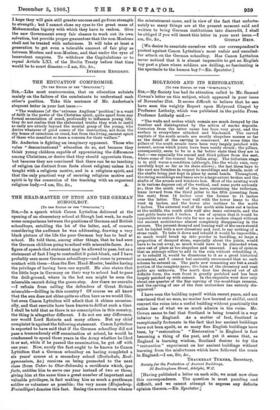THE EDUCATION COMPROMISE.
[To THE EDITOR OF THE " SPECTATOR." J SIR,—Like most controversies, that on education subsists mainly on the failure of the combatants to understand each
other's position. Take this sentence of Mr. Anderton's eloquent letter in your last issue :—
" The weakness [of the 'extreme Anglican' position] is a want of faith in the power of the Christian spirit, quite apart from any formal enunciation of creed, profoundly to influence young life; they do not realise that the elaborated truths they wish to instil so early are utterly beyond the mental grasp of the young, who derive whatever of good comes of the instruction, not from the dry bones of catechism or creed, but from the living, earnest spirit of those who manifest so keen a concern for their welfare."
Mr. Anderton is fighting an imaginary opponent. Those who value "denominational" education do so, not because they think young children capable of appreciating the differences among Christians, or desire that they should appreciate them, but because they are convinced that there can be no teaching of religion (as distinct from facts about religion) unless it is taught with a religious motive, and in a religious spirit, and that the only practical way of securing religious motive and spirit is by the connexion of the teaching with an organised religious body.—I am, Sir, &c., A.






































































 Previous page
Previous page